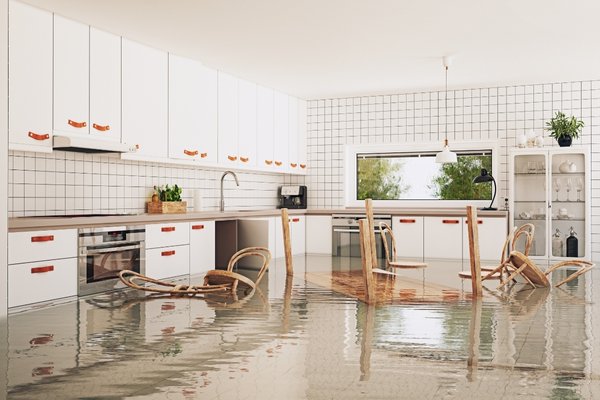
27 Apr Does House Insurance Cover Water Damage? Things To Know!
Whether it’s a leaky dishwasher, a burst pipe, or a heavy rainfall from an extreme weather event, water damage in the home can cause thousands of dollars of damage and often require expensive repairs. Most house insurance policies cover some causes of water damage, but don’t cover every type. To ensure you’re clear on what water damage is and isn’t covered in your house insurance policy, here’s a helpful guide including tips on how to protect your home from water damage.
Water damage that IS covered by house insurance
House insurance is designed to cover you in the event of sudden, accidental or unforeseen damage or loss, and most house insurance policies cover water damage caused by natural disasters and everyday accidents.
Flooding due to heavy rain, extreme high tides or overflowing rivers is usually covered by house insurance. However, if your home is in a flood zone, you can expect to pay more for your house insurance cover. When buying a new home:
- Pay careful attention to the layout of the property and the local geography.
- Always check the LIM report (Land Information Memorandum) for hazards.
- Check your council’s online hazard maps to see whether the property is built in a flood zone, a storm surge area, or is sited close to the high tide level.
“Sudden and accidental” water damage is usually also covered by house insurance and includes damage from things like a burst water pipe or sudden overflow from a hot water cylinder or a leaking ceiling coming from a roof damaged in a storm. Check your house insurance policy for specific cover and to see what everyday accidents are covered.
Water damage that MAY NOT be covered by house insurance
House insurance doesn’t cover gradual damage or deterioration to property over time. Gradual damage, including wear and tear, corrosion, rot and mildew, is often not easy to see and, while the results of gradual damage may feel sudden, the damage may have been getting worse for some time.
A good example of this is a leaking hot water cylinder which, over the space of several months, has rotted the floorboards beneath it. Replacement of the hot water cylinder isn’t covered by house insurance as this would be considered gradual damage.
Weathertightness issues or “leaky homes” are also typically not covered by house insurance. “Leaky homes” are homes built between the late 1980s and the mid-2000s using plaster cladding are a major concern in New Zealand and considered high risk to insurers. These types of homes need to be well-maintained to avoid water seeping into the home and causing mould, mildew build-up, and foundation issues.
If you are considering buying a property that has any of the features of a leaky home, it’s imperative you arrange an independent building inspection before making an offer. Consult with a Max Mortgages Mortgage Adviser to ensure the property is acceptable to the lender and meets lenders’ requirements, as your mortgage may be declined if the house you are buying is a leaky home.
Tips to protect your home from water damage
Water damage is one of the common causes of property-related damage and loss. Use these simple steps to keep your home safe from water damage:
- Know where the main water valve is located and how to shut off the water supply if you need to.
- Proactively check for leaks or signs of water under sinks, near appliances such as the dishwasher and washing machine, and around the hot water cylinder.
- Keep your gutters and downpipes clear of debris as blocked and overflowing gutters can lead to flooding, mould, and damp.
- Inspect your roof inside and out, checking for signs of water leaks, damp spots, or stains. Outside, check for cracks or broken tiles and repair these right away.
- Look for moisture and mould inside the home, checking for flaking paint or peeling wallpaper, black marks on walls, and condensation on windows, which may be signs of damp.
- Regularly maintain your home to help prevent water damage. Talk to the Personal Lending Team at Max Loans about Home Improvement Loans to help you keep up with home maintenance.
The right house insurance cover for your home
Wherever you live, it’s important to understand the potential risks you may be exposed to when it comes to water damage, and to ensure your house insurance adequately covers that risk. Contact a Max Insurances Adviser for NZ insurance advice, we can help you understand your house insurance policy, exclusions and limitations, we can also ensure your policy is up to date and that you have the right cover. If you need help processing a claim, talk to the team about how we can help.
Request a Call Get a QuoteFind this article helpful? Don’t forget to like it or share it on Facebook.


